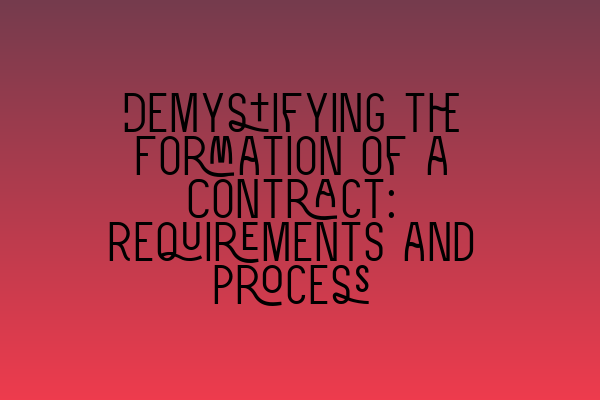Demystifying the Formation of a Contract: Requirements and Process
Welcome to SQE Contract Law, your source for quality information about contract law and its application in legal practice. In this blog post, we will demystify the formation of a contract by outlining its requirements and the process involved.
Understanding the Basics: What is a Contract?
Before diving into the intricacies of contract formation, it is essential to understand the basics. A contract is a legally binding agreement between two or more parties, which creates enforceable obligations. It is crucial to adhere to specific requirements to ensure the validity and enforceability of a contract.
The Requirements for a Valid Contract
In order for a contract to be valid, it must satisfy certain requirements:
- Offer and Acceptance: A contract starts with an offer made by one party, which must be accepted by the other party. Both the offer and acceptance must be clear, unequivocal, and communicated to the other party.
- Intention to Create Legal Relations: Parties to a contract must demonstrate a clear intention to be legally bound by the terms of the agreement. Not all agreements between parties create enforceable legal obligations, such as social agreements or invitations to negotiate.
- Consideration: Consideration refers to something of value exchanged between the parties. It could be money, goods, services, or a promise to do or refrain from doing something. Both parties must provide consideration for a contract to be valid.
- Capacity: To enter into a contract, parties must have the legal capacity to do so. This means they must be of legal age, mentally sound, and not under any legal disability that prevents them from understanding and fulfilling the terms of the contract.
- Consent: The consent of both parties must be freely given and not obtained through fraud, misrepresentation, undue influence, or mistake. Both parties must genuinely agree to the terms of the contract without any form of coercion.
- Legality: A contract must have a lawful object and purpose. It cannot involve any illegal activities or actions that go against public policy.
Understanding these requirements is crucial for both solicitors and individuals involved in contract negotiations or disputes. In order to ensure a valid contract, it is essential to seek legal advice and adhere to these fundamental principles.
The Contract Formation Process
The process of contract formation typically involves several key steps:
- Preliminary Negotiation: Parties engage in preliminary negotiations to discuss the terms of the potential contract and reach a mutual understanding. These negotiations may involve making offers, counteroffers, and exploring various terms.
- Offer and Acceptance: Once the terms have been agreed upon, one party makes a formal offer to the other. The offer must be clear, complete, and communicated to the offeree.
- Acceptance and Communication: The offeree then accepts the offer, indicating their agreement to the terms. Acceptance must be communicated to the offeror, usually through an explicit acceptance or by performing the requested actions.
- Consideration: Once acceptance has occurred, consideration is exchanged between the parties. This could be the payment of money, transfer of goods, or any other agreed-upon form of consideration.
- Contractual Agreement: At this point, all the necessary elements for a valid contract are present. The parties have reached a mutual agreement, fulfiling all the requirements for a valid and enforceable contract.
- Execution and Performance: The parties enter the stage of execution and performance, where they fulfill their respective obligations as laid out in the contract. This may involve paying for goods or services, delivering goods, or providing the agreed-upon services.
- Termination or Renewal: Contracts may eventually come to an end through termination or expiration. Parties may also choose to renew or extend the contract by mutual agreement.
Understanding this step-by-step process is essential for effectively navigating contract formation. Whether you are a solicitor drafting contracts on behalf of clients or an individual entering into a contract, knowledge of the process ensures compliance and protects your interests.
If you are preparing for the SQE exam, make sure to check out our related articles for additional exam preparation resources:
- SQE 1 Practice Exam Questions
- SQE 1 Practice Mocks FLK1 FLK2
- SQE 2 Preparation Courses
- SQE 1 Preparation Courses
- SRA SQE Exam Dates
We hope this blog post has provided some clarity on the formation of a contract. Remember, contract law is a complex area, and seeking legal advice from a qualified solicitor is always recommended to ensure your rights and obligations are fully protected.
